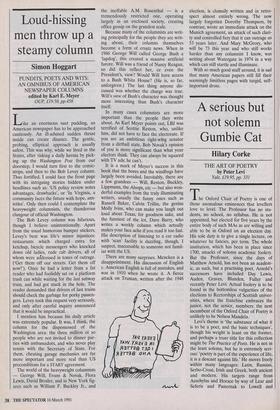Loud-hissing men throw up a steamy column
Simon Hoggart
PUNDITS, POETS AND WITS: AN OMNIBUS OF AMERICAN NEWSPAPER COLUMNS edited by Karl E. Meyer OUP, £19.50, pp.458 Like an enormous suet pudding, an American newspaper has to be approached cautiously. An ill-advised sudden thrust inside can create disaster. The gentle, probing, elliptical approach is usually safest. This was why, while we lived in the States, after risking a daily hernia by pick- ing up the Washington Post from our doorstep, I would turn first to the comic- strips, and then to the Bob Levey column. Thus fortified, I could face the front page with its intriguing stories hidden under headlines such as: 'US policy review notes advantages, drawbacks', or 'In Virginia, a community faces the future with hope, anx- ieties'. Only then could I contemplate the heavyweight columnists, the thunderous clangour of official Washington.
The Bob Levey column was hilarious, though I believe unintentionally. Apart from the usual humorous bumper stickers, Levey's beat was life's minor injustices: restaurants which charged extra for ketchup, bicycle messengers who knocked down old ladies, rude cab drivers, all of whom were actdressed in tones of outrage. (`Get them off our streets. Get them off now!'). Once he had a letter from a fat reader who had foolishly sat on a platform trash can while waiting for the last subway train, and had got stuck in the hole. The reader demanded that drivers of last trains should check the garbage for porky passen- gers. Levey took this request very seriously, and only after careful inquiry announced that it would be impractical.
I mention him because his daily article was extremely popular. It was, I think, the column for the dispossessed of the Washington area: the three million or so people who are not invited to dinner par- ties with ambassadors, and who never play tennis with the Secretary of State. For them, cheating garage mechanics are far more important and more real than US preconditions for a START agreement.
The world of the heavyweight columnists — George Will, Evans & Novak, Flora Lewis, David Broder, and in New York fig- ures such as William F. Buckley Jr., and the ineffable A.M. Rosenthal — is a tremendously restricted one, operating largely in an enclosed society, creating office gossip on the grandest scale.
Because many of the columnists are writ- ing principally for the people they are writ- ing about, their columns themselves become a form of ersatz news. When in 1986 George Will called George Bush a 'lapdog', this created a massive artificial furore. Will was a friend of Nancy Reagan, so did this reflect her, or even the President's, view? Would Will have access to a Bush White House? (He is, so far, unforgiven.) The last thing anyone dis- cussed was whether the charge was true. Will's view of Bush's character was thought more interesting than Bush's character itself.
In many cases columnists are more important than the people they write about. As Karl Meyer points out, LBJ was terrified of Scottie Reston, who, unlike him, did not have to face the electorate. If you are an ambitious right-wrng senator from a dirtball state, Bob Novak's opinion of you is more significant than what your electors think. They can always be squared with TV ads; he can't.
It is a mark of Meyer's success in this book that the bores and the windbags have largely been avoided. Inevitably, there are a few grandees — Will, Reston, Buckley, Lippmann, the Alsops, etc — but also won- derful examples from the truly illuminating writers, usually the funny ones such as Russell Baker, Calvin Trillin, the genius Molly Ivins, who can make you laugh out loud about Texas, for goodness sake, and the funniest of the lot, Dave Barry, who writes a weekly column which actually makes your face ache if you read it too fast. His description of listening to a car radio with 'scan' facility is dazzling, though, I suspect, inaccessible to someone not famil- iar with the US.
There are many surprises. Mencken is a disappointment. His discussion of English v. American English is full of mistakes, and was in 1910 when he wrote it. A fierce attack on Truman, written after the 1948
election, is clumsily written and in retro- spect almost entirely wrong. The now largely forgotten Dorothy Thompson, by contrast, wrote an immediate attack on the Munich agreement, an attack of such clari- ty and controlled fury that it can outrage us 53 years later. And Mary McGrory, who will be 73 this year and who still works harder than any columnist I know, was writing about Watergate in 1974 in a way which can still startle and illuminate.
With so much good stuff around, it is sad that many American papers still fill their seemingly limitless pages with turgid, self- important dross.


























































 Previous page
Previous page